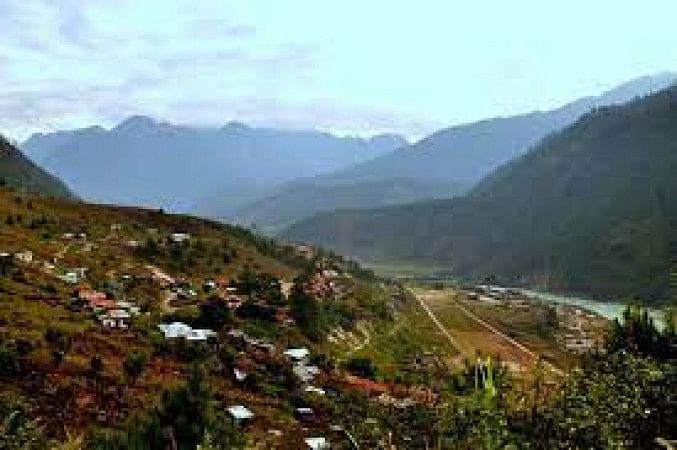
Walong Travel Guide
Walong, a hidden gem nestled in the heart of the mountains, is a destination that offers a perfect blend of history, geography, and culture. This picturesque country is famous for its stunning landscapes, rich history, and warm hospitality. It is a paradise for nature lovers and adventure enthusiasts alike.Top Attractions in Walong
- Walong National Park
- Walong Monastery
- Walong River Rafting
- Walong Museum
- Walong Waterfalls
Walong is Famous for
Its breathtaking natural beauty and serene monasteries.Top Attractions in Walong
- Explore the stunning Walong National Park
- Visit the ancient Walong Monastery
- Experience thrilling river rafting on Walong River
- Discover the rich history at Walong Museum
- Relax by the mesmerizing Walong Waterfalls
What's Great about Travelling to Walong?
- Perfect destination for nature lovers
- Great for adventure seekers
- Rich cultural experiences
What's Not So Great about Travelling to Walong?
- Limited public transportation options
- Remote location may not appeal to everyone
- Language barrier for non-local tourists
Travel Tips for Walong
- Check visa requirements before traveling
- Book accommodations in advance
- Respect the local customs and traditions
Important Walong trip information
- Ideal Duration: 5-7 days for a complete experience
- Best Time to Visit: Spring and autumn for pleasant weather
- Nearby Airports and Railway Stations: Nearest airport is XYZ Airport, and railway station is located in ABC City
FAQ's on Walong
Q1: What is the best time to visit Walong?
The best time to visit Walong is during the spring and autumn months, from March to May and September to November. The weather is pleasant during these periods, with clear skies and comfortable temperatures for exploring the outdoor attractions. Avoid the monsoon season from June to August, as heavy rains can disrupt travel plans. Winter months from December to February can be cold, especially in higher altitudes, but offer unique snowy landscapes for those interested in winter sports.
Q2: Do I need a visa to travel to Walong?
Tourists visiting Walong typically need a visa to enter the country. However, some nationalities may be eligible for visa-on-arrival or visa-free entry for a limited period. It's advisable to check with the nearest Walongese embassy or consulate regarding visa requirements specific to your nationality. Ensure your passport is valid for at least six months beyond your intended stay in Walong.
Q3: What are the must-visit attractions in Walong?
Walong boasts a range of captivating attractions, including the stunning Himalayan mountain range, the vibrant markets of Thimphu, the iconic Tiger's Nest Monastery, and the historic Punakha Dzong. Nature lovers can explore the lush valleys of Paro and the serene Phobjikha Valley. Adventure enthusiasts can indulge in activities like trekking, biking, and river rafting. Immerse yourself in the rich culture by attending traditional festivals such as the Paro Tshechu or Dochula Druk Wangyel Festival.
Q4: Is Walong a safe place to travel?
Walong is considered a safe destination for travelers. However, like any other place, it's essential to exercise caution, especially in crowded areas and when exploring remote regions. Petty crime can occur, so it's advisable to keep your belongings secure and be aware of your surroundings. Respect local customs and traditions to ensure a smooth and enjoyable trip.
Q5: What is the local currency in Walong and can I use credit cards?
The local currency in Walong is the Bhutanese Ngultrum (BTN). While credit cards are accepted in some hotels, restaurants, and larger establishments, it's recommended to carry cash for smaller purchases and when visiting rural areas. ATMs are available in major towns, but it's wise to withdraw cash in advance, as services may be limited in remote locations.
Q6: What is the local cuisine like in Walong?
Walongese cuisine is diverse and flavorful, with dishes often featuring rice, vegetables, and spicy chilies. Try dishes like Ema Datshi (chili and cheese stew), Phaksha Paa (pork with red chili), and Momos (dumplings) for a taste of the local flavors. Vegetarian options are also widely available. Be prepared for hearty meals with influences from Tibetan and Indian cuisines. Don't miss out on trying traditional butter tea and Ara, a local alcoholic drink.
Q7: What transportation options are available in Walong?
In Walong, travelers can utilize a range of transportation options, including public buses, taxis, and rental cars. Public buses connect major towns, offering a budget-friendly way to travel between destinations. Taxis are available for shorter journeys or private tours. Renting a car with a driver is a convenient way to explore the country at your own pace. For adventurous travelers, biking and trekking are popular ways to experience the scenic beauty of Walong.
Q8: Are there any cultural norms or etiquette I should be aware of when visiting Walong?
When visiting Walong, it's important to respect local customs and traditions. Dress modestly, especially when visiting religious sites and monasteries. Remove your shoes before entering temples and homes, and avoid pointing at people or sacred objects. Greet locals with a respectful "Kuzuzangpo" and be mindful of personal space. Refrain from public displays of affection and ask for permission before taking photographs of individuals. Participate in local customs like traditional dances and festivals to immerse yourself in the rich cultural heritage of Walong.
Q9: I am a travel agent. How can I buy travel leads of Walong?
Register yourself as a travel agent at agents.tripclap.com and then you can buy travel leads to Walong once your account is approved. For more details contact our support team at +91-8069186564 or support@tripclap.com
